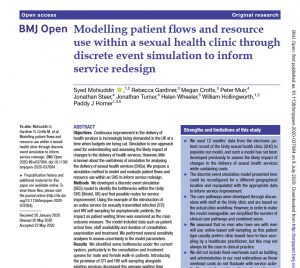STI and HIV self-sampling could reduce patient waiting times at sexual health clinics
9 July 2020
Enabling asymptomatic patients to self-sample for sexually transmitted infections (STIs) and human immunodeficiency virus (HIV) could reduce waiting times at sexual health clinics, according to modelling by NIHR ARC West published in BMJ Open.
This finding could inform the redesign of sexual health services across the UK, at a time when demand for HIV and sexually transmitted infection testing is rising but local authority budgets for these services are shrinking.
Researchers developed a discrete event simulation (DES) model to analyse the flow of patients within Bristol’s Unity Sexual Health Services and find possible ways to improve the services Unity provides. This identified bottlenecks in the consultation and treatment queues for walk-in patients.
Unity introduced an online self-sampling service for STIs and HIV in June 2017. Modelling this new service alongside existing services showed that the average waiting time for all patients decreased to 88 minutes from 128 minutes. Self-sampling also reduced the cost of staff time for managing each patient to £72.64, compared to £88.74 under the same system but without self-sampling.
Dr Paddy Horner, Associate Professor in Sexually Transmitted Infections at the University of Bristol, said:
“Supporting patients who show no symptoms to take a sample in the privacy of their own homes could be beneficial in reducing waiting times in clinics. In this instance, Unity delivered the online service themselves – rather than contracting an external provider – which also helped to bring down costs. The new service has been great for patients and particularly useful for helping manage patients following lockdown as a result of the COVID-19 pandemic.
“We hope these findings will support policymakers and healthcare professionals across the UK who are interested in setting up similar online testing services.”
Dr Syed Mohiuddin, Research Fellow in Modelling and Simulation in Health Economic Evaluation at the University of Bristol and NIHR ARC West, said:
“Understanding whether a service change leads to an improvement in care is tricky, but this type of modelling can give us valuable insights into the design of sexual health services, leading to measurable improvements. Our research suggests that extending this method by collecting more data and building more informed models seems worthwhile.”
Paper
Syed Mohiuddin, Rebecca Gardiner, Megan Crofts, Peter Muir, Jonathan Steer, Jonathan Turner, Helen Wheeler, William Hollingworth, Paddy Horner
Paper
